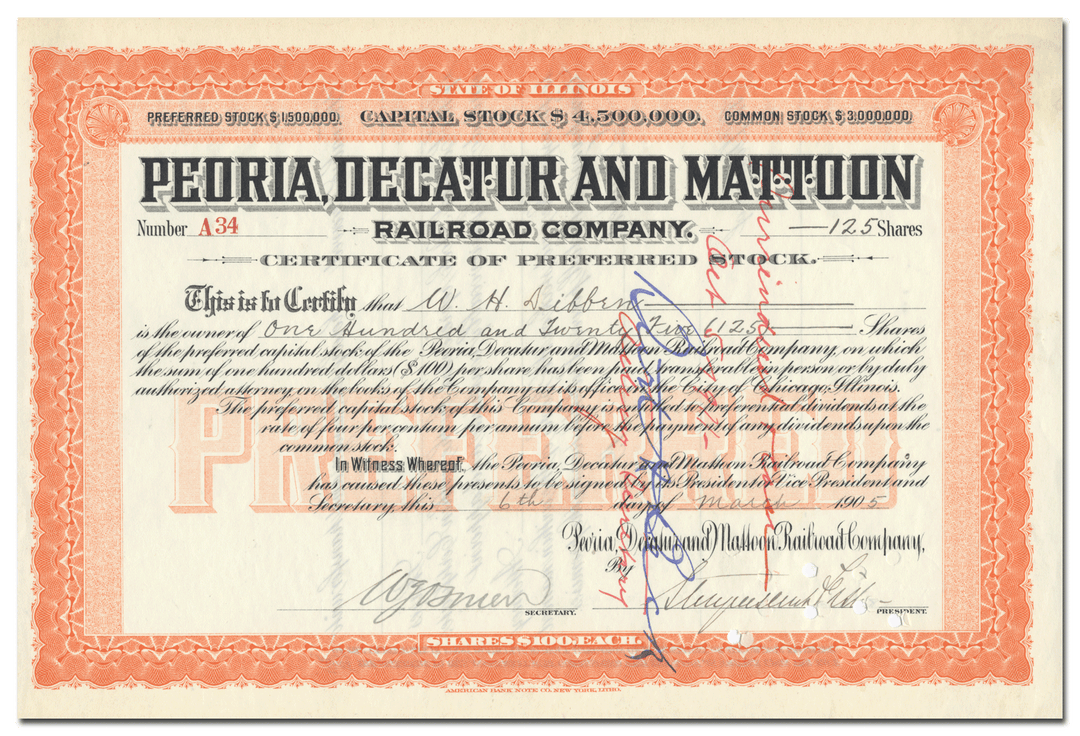
Peoria, Decatur and Mattoon Railroad Company (Signed by Stuyvesant Fish)
- In stock
- Backordered, shipping soon
- Guaranteed authentic document
- Orders over $35 ship FREE to U. S. addresses
- Earn rewards points with every order
Product Details
Nicely engraved antique stock certificate from the Peoria, Decatur and Mattoon Railroad Company dating back to the early 1900's. This document, which is signed by Stuyvesant Fish as the company President as well as the company Secretary, was a printed by the American Bank Note Company and measures approximately 10 1/2" (w) by 7" (h).
Images
You will receive the exact certificate pictured.
Historical Context
The Peoria, Decatur & Evansville Railway was formed in 1880 as a consolidation of the Pekin, Lincoln & Decatur Railroad and the Decatur, Mattoon and Southern Railroad.
In the summer of 1900 the PD&E was split into two distinct corporations - the Peoria, Decatur and Mattoon Railroad and the Mattoon and Evansville Railroad. In September of that same year, the Illinois Central took control of the Peoria, Decatur and Mattoon Railroad, and assumed full ownership in 1905.
Stuyvesant Fish

Stuyvesant Fish's Signature
A descendant of Petrus Stuyvesant, a grandson of Colonel Nicholas Fish of Revolutionary War fame, the youngest son of Hamilton Fish (Secretary of State under President Grant) — Stuyvesant Fish came from the stock of pioneers and joined the generation of great railroaders. Born in New York in 1851, and graduated from Columbia 20 years later he became successively a clerk in the Illinois Central Railroad, secretary to its President, and a clerk in the banking house of Morton, Bliss & Co. Subsequently he bought a seat on the New York Stock Exchange, and became a Director in the Illinois Central. After several years of railroad experience with that and other roads, he was elected its President in 1887.
The subsequent clash between Mr. Fish and the late E. H. Harriman for the control of the Illinois Central proved to be one of the epochal conflicts in the history of Wall Street. Mr. Harriman, who sought the Central as an outlet to the Union Pacific, broke with Mr. Fish in 1906, and after initially getting the worst of the bitter struggle which ensued, finally succeeded in securing enough shareholders' proxies to eliminate him from the affairs of the road, as well as from the Mutual Life Insurance Company. Feeling ran high on both sides throughout this financial feud, and in one Directors' meeting Mr. Fish struck and floored J. T. Harahan, who had succeeded him as President of the Illinois Central. Mr. Fish was a railroad executive of the old order, rough and ready in speech, cautious in administration, scrupulously honorable in his engagements, and completely impatient of fallacious economics. Even in his youth he played his part against greenback inflation, and for the risky and speculative methods of Wall Street railroad amalgamation, whose excesses were justified only by their aggregate brilliant results, he had an inherent mistrust. He was a stubborn fighter but invariably a good loser. His resentment of the prohibition amendment, and his efforts for its repeal, were characteristic of his sturdy individualism.
Additional Information
Certificates carry no value on any of today's financial indexes and no transfer of ownership is implied. All items offered are collectible in nature only. So, you can frame them, but you can't cash them in!
All of our pieces are original - we do not sell reproductions. If you ever find out that one of our pieces is not authentic, you may return it for a full refund of the purchase price and any associated shipping charges.


